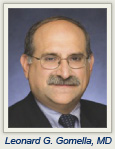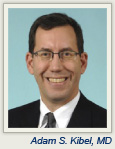The 2012 Genitourinary Cancers Symposium, to be held in San Francisco February 2–4, will feature some exciting advancements in the field that center on personalized cancer care.
 “The major cancer discussed at the meeting tends to be prostate cancer, and there hasn’t yet been a lot of specific targeting of pathways involving gene profiles for prostate cancer,” said Leonard G. Gomella, MD, Chair of the symposium Program Committee. “But we’re starting to see more in that area, and that will be on tap at the meeting.”
“The major cancer discussed at the meeting tends to be prostate cancer, and there hasn’t yet been a lot of specific targeting of pathways involving gene profiles for prostate cancer,” said Leonard G. Gomella, MD, Chair of the symposium Program Committee. “But we’re starting to see more in that area, and that will be on tap at the meeting.”
Dr. Gomella is the Bernard W. Godwin Professor of Prostate Cancer at the Jefferson Kimmel Cancer Center in Philadelphia, as well as the center’s Chair of the Department of Urology and Associate Director of Clinical Affairs, and Clinical Director of the Jefferson Kimmel Cancer Center Network.
Truly Multidisciplinary
Several high-interest trials are expected to be reported at the meeting as late-breaking abstracts, said Dr. Gomella. “Traditionally this meeting serves as a point of reporting important preliminary trials in a variety of tumor types,” he said. “We anticipate that this will be the case this year, with many new agents in late stages of study for prostate,  bladder, and kidney cancer in particular.”
bladder, and kidney cancer in particular.”
The multidisciplinary meeting is open to all members of the cancer care community interested in the prevention, screening, evaluation, and management of genitourinary cancer, including medical oncologists, urologists, radiation oncologists, radiologists, pathologists, epidemiologists, pharmacologists, and translational-oriented laboratory scientists.
“While other meetings are dominated by one particular treatment paradigm, the Genitourinary Cancers Symposium is truly multidisciplinary in scope and content,” said Adam S. Kibel, MD, Chair of the symposium’s Steering Committee and Chief of Urologic Surgery at Brigham and Women’s Hospital. “This maximizes the opportunity to better understand how integrated care can best be used to maximize chance of cure in our patients.”
Oncology Fellows: Avoiding Myopia
Dr. Kibel said he’s particularly excited about the opportunity for young oncologists to broaden their horizons in the field and to be present as academic leaders debate new directions for their various disciplines.
“Junior faculty and fellows quickly become immersed in the dogma of their institution; an opportunity to hear diverging points of view is invaluable,” said Dr. Kibel. “In addition, at the GU Symposium, they have the opportunity to hear leaders in the field debate the issues and strive to reach consensus on where the field should be going next.”
Like last year, many of the symposium’s sessions will be interactive, with attendees encouraged to submit questions during certain sessions via text, tweet, or online. In addition, they’ll be able to access select symposia using their handheld devices or computer, 12 hours after the presentation, searchable by title, author, or track. Attendees will also receive an eTote—a USB device that contains proceedings content in digital format—including meeting abstracts, education articles, and links to the symposium’s Daily News.
To learn more about the symposium and to register, go to http://gucasym.org/. ■
© 2011. American Society of Clinical Oncology. All rights reserved.

